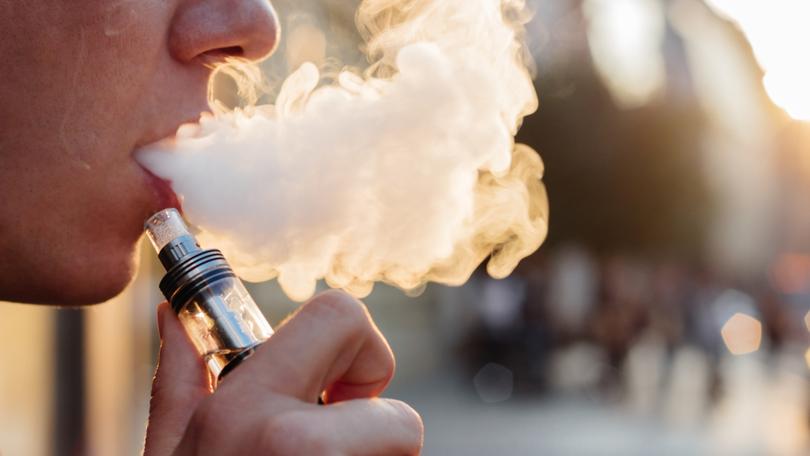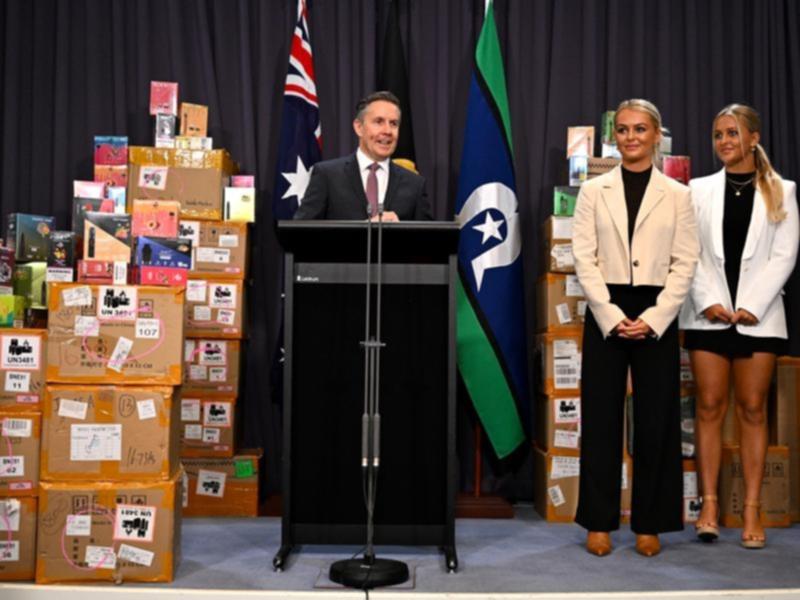AMA NSW warns millions of illegal vapes could be stockpiled in the state
Big tobacco is muddying the waters around the health impacts of vaping while governments were “blindsided” by the rise of e-cigarettes.

Big tobacco is muddying the waters around the health impacts of vaping while governments were “blindsided” by the rise of e-cigarettes.
A NSW parliamentary inquiry on Friday heard testimony that millions of illicit vapes could be stockpiled across the state and the average vaper puffed on their e-cigarette more than 500-times a day.
Australian Medical Association NSW president Michael Bonning said many of the risks around vaping were yet to be fully understood and it took decades for the true health impact of smoking to be revealed.
Sign up to The Nightly's newsletters.
Get the first look at the digital newspaper, curated daily stories and breaking headlines delivered to your inbox.
By continuing you agree to our Terms and Privacy Policy.“We see the power powerful tobacco industry disputing the science and muddying the waters with regards to how significant this risk is,” he said.
“We see the same tactics at play day in and day out and we are hooking a new generation on nicotine by marketing directly to young people.”
Dr Bonning said there were potentially millions of illegal vapes stockpiled in NSW that would end up in the hands of young people over the next few years.
University of Sydney emeritus professor Simon Chapman, a longtime anti-tobacco campaigner, said the vaping black market had flourished in Australia amid a “regulatory no man’s land”.
“The dilemna we’ve gotten ourselves into is vaping has come along and has blindsided legislators,” he said.
“They haven’t known what to do about it.”
Professor Chapman said the average vaper puffed on their e-cigarette about 506 times a day, which was five times more than the average smoker puffed on a cigarette.
University of Sydney associate professor Becky Freeman told a NSW parliamentary inquiry on Friday that there was “nothing magic or secret behind” behind the rise of vaping in Australia.
“It’s the availability of flavoured, brightly coloured, packaged vapes that have a high concentration nicotine salts that are being marketed to kids,” said Professor Freeman, who is also chief investigator on the Cancer Council NSW’s generation vape research project.
“It’s been a recipe for disaster. And our inability to enforce our poison standard law so we can protect children from this.
“There’s nothing magic or secret about it. It’s products designed for children, marketed to children, available to children being used by children.”
To be effective, the prevention of illegal importations needs to be enforced via the Commonwealth with parallel and synchronised enforcement then undertaken by police.
Most vapes sold over the counter contain nicotine, regardless of whether they disclose it, and the inquiry heard Curtin University research in 2020 found vapes contained dangerous chemicals including fish killer, weed killer and arsenic.
One key issue within the current regulatory framework is that only vapes containing nicotine are prohibited from sale over the counter, with manufacturers simply bypassing laws by labelling e-cigarettes containing nicotine as nicotine-free.
Lung Foundation Australia chief executive officer Mark Brooke said there “was no silver bullet” to tackle vaping in Australia and said successful tobacco harm reduction in Australia had been achieved through a co-ordinated mix of policies.

“So one of the things that we know is that a disorganised approach by states and territories and federal government where they’re out of sync could be a major barrier to the success of this program,” he said.
Currently, responsibility for enforcing laws on vapes and e-cigarettes lies with state and territory bodies while the Australian Border Force is responsible for controlling importation.
The Royal Australian College of General Practitioners said in a submission to the inquiry that vaping remained widespread in NSW, suggesting the current regulatory framework was not effective in preventing supply.
“To be effective, the prevention of illegal importations needs to be enforced via the Commonwealth with parallel and synchronised enforcement then undertaken by police,” the submission said.
Federal Health Minister Mark Butler has introduced legislation aimed at cracking down on vaping. The proposed reforms will ban the sale of all vapes by tobacconists, vape shops and convenience stores — regardless of whether they contain nicotine.
Vapes and e-cigarettes for the treatment of cigarette addiction will still be able to be purchased with a prescription from pharmacies.

